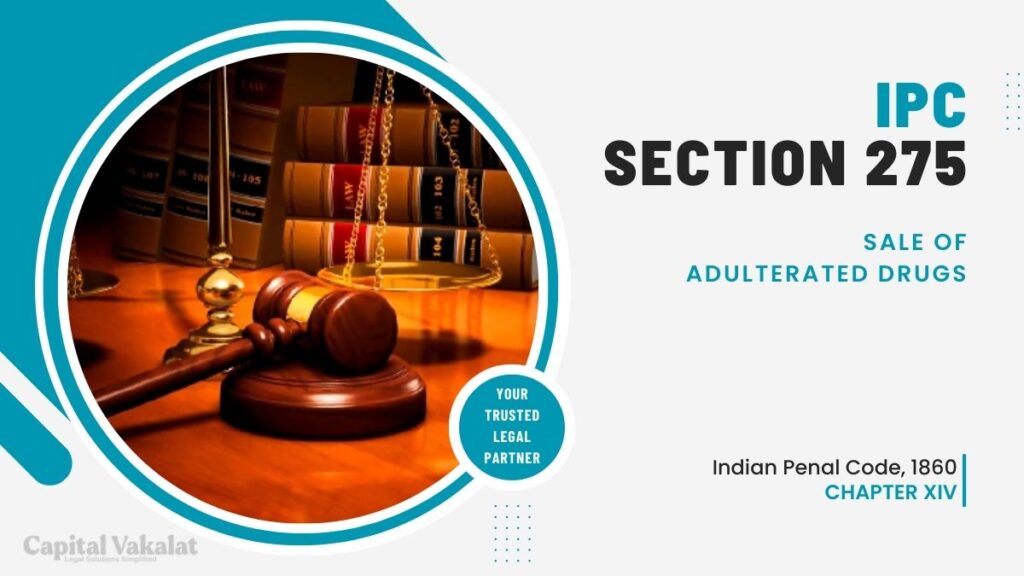In India, the Indian Penal Code (IPC) serves as the legal backbone for addressing various criminal offenses. One such crucial provision is Section 275 IPC, which deals with the sale of adulterated drugs.

This article aims to shed light on the intricacies of Section 275 IPC and its profound implications for public health and safety.
Understanding Adulterated Drugs
Adulterated drugs are a grave concern, as they pose a significant risk to individuals’ health. These drugs have been tampered with or contain substandard or harmful components, which can render them ineffective or, even worse, harmful to consumers. Adulteration can encompass a wide range of malpractices, including the addition of impurities, incorrect dosages, or the substitution of active ingredients with cheaper alternatives. The consequences of consuming such drugs can be dire, making it essential to combat this issue with the full force of the law.
The Legal Implications of Selling Adulterated Drugs
Section 275 IPC was enacted with the understanding that the sale of adulterated drugs not only jeopardizes individual health but also endangers public safety. This provision criminalizes such acts and emphasizes the gravity of the offense. Those found guilty under Section 275 IPC may face severe legal consequences, including imprisonment and fines. The severity of punishment depends on the extent of adulteration and the potential harm caused to the public.
The Importance of Quality Control in Pharmaceuticals
Quality control is the linchpin of the pharmaceutical industry. Rigorous testing and adherence to regulatory standards are vital to ensure that drugs are safe and effective. Adulterated drugs underscore the pressing need for stringent quality control measures within the pharmaceutical sector. The pharmaceutical industry must be unwavering in its commitment to maintaining the highest standards of safety and efficacy.
Enforcement of Section 275 IPC
The enforcement of Section 275 IPC falls under the purview of law enforcement agencies. Dedicated pharmaceutical inspectors and drug control departments play a significant role in monitoring and inspecting drug manufacturing and distribution facilities. Their work is essential in identifying instances of adulteration, ensuring that manufacturers adhere to quality standards, and prosecuting those found guilty of violating Section 275 IPC.
Consequences of Violating Section 275 IPC
Violating Section 275 IPC is a serious offense with grave consequences. Convictions can lead to imprisonment, fines, or both, depending on the nature and extent of adulteration. This legal provision acts as a strong deterrent against unethical practices in the pharmaceutical industry, as it sends a clear message that the sale of adulterated drugs will not be tolerated.
Real-life Cases of Adulterated Drug Sales
Numerous real-life cases have come to light in India, exposing the sale of adulterated drugs. These cases serve as grim reminders of the potential harm that can be caused by the illicit trade in substandard medications. Such incidents not only harm patients but also erode trust in the healthcare system. By examining these cases, we gain a deeper understanding of the real-world consequences of adulterated drug sales and the urgency of addressing this issue.
Preventing the Sale of Adulterated Drugs
Preventing the sale of adulterated drugs is a multifaceted challenge that demands collaborative efforts. It begins with stricter regulations and close monitoring of drug manufacturers and distributors. Additionally, raising awareness among consumers and healthcare providers is crucial. Ensuring that everyone is vigilant and informed can help combat this issue effectively.
The Role of Consumers and Healthcare Providers
Consumers and healthcare providers play pivotal roles in the fight against adulterated drugs. Vigilance is essential – if a medication appears suspicious or causes unexpected side effects, it should be reported. Adhering to prescribed medicines is equally important, as it reduces the risk of patients resorting to unverified sources for their treatments. By actively participating in this battle, consumers and healthcare providers can contribute to safer pharmaceutical practices.
Conclusion: Ensuring Safe Medications for All
In conclusion, Section 275 IPC stands as a formidable legal provision against the sale of adulterated drugs, safeguarding the health and safety of the public. The battle against adulterated drugs requires a collective effort from regulatory authorities, pharmaceutical companies, healthcare providers, and consumers. Ensuring that medications are safe, effective, and trustworthy is paramount for public health. By working together, we can strive to make a world where no one’s health is compromised by the sale of adulterated drugs.
Frequently Asked Questions
How can consumers identify adulterated drugs?
Consumers should be vigilant for unusual packaging, unexpected side effects, or changes in the appearance of the medication. If in doubt, consult a healthcare professional.
What role do pharmaceutical inspectors play in enforcing Section 275 IPC?
Pharmaceutical inspectors are responsible for monitoring and inspecting drug manufacturing facilities to identify instances of adulteration and ensure compliance with quality standards.
What measures can pharmaceutical companies take to prevent adulteration?
Pharmaceutical companies should implement robust quality control measures, conduct regular testing, and ensure compliance with all relevant regulations.
How can the public contribute to preventing the sale of adulterated drugs?
The public can contribute by reporting suspicious medications, adhering to prescribed medicines, and staying informed about the risks associated with adulterated drugs.